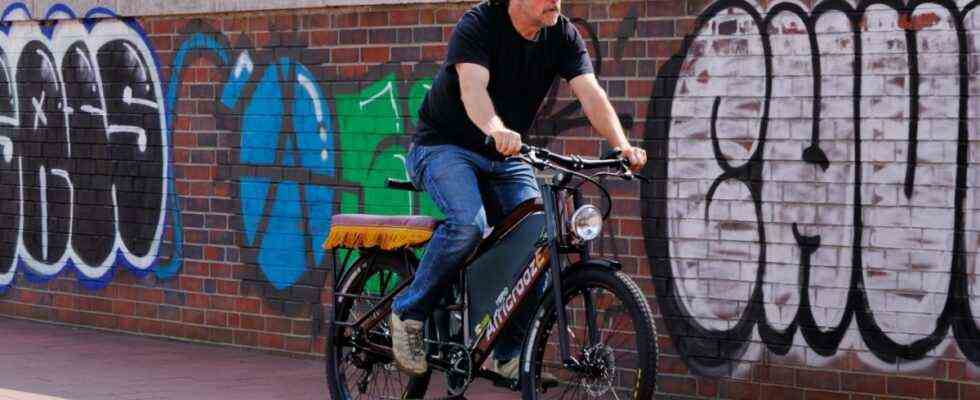Jürgen Perschon has been pursuing his idea for a little more than four years. The teacher from Northern Germany wants to bring sustainable mobility to Africa – in the form of a pedelec, a bicycle with an auxiliary electric motor. The bike called “Africrooze” should be up to 30 km / h and it should be able to load up to 100 kilograms in addition to the rider. And it should ensure that people in Africa can be mobile without having to burn fossil fuels. His Africrooze, Perschon is convinced, “means more freedom and a higher quality of life” for the people in Africa.
He developed the e-bike together with the First African Bicycle Information Organization (Fabio) from Uganda and the bicycle manufacturer HNF Nicolai from Biesenthal near Berlin. Perschon himself has also set up a non-profit association to push the project forward – the European Institute for Sustainable Transport, or Eurist for short. He has also found a prominent patron: The actor and director Bjarne Mädel (known among other things from the TV series “Tatortreiniger”), with whom Perschon went to school, supports the project.
The first prototypes of the e-bike have already been tested by Fabio in Africa; Within two years the bikes have covered more than 20,000 kilometers. The experience has shown, said Fabio director Katesi Najiba Bike picturethat there is definitely a need for special e-bikes. With the long wheelbase, the powerful engine and a stable aluminum frame, the Africrooze is designed for the special requirements in Africa, says Perschon. In addition, the pedelecs have a long and solidly built luggage rack, so that even heavy loads are not a problem. According to him, the range is around 50 kilometers. The bikes should be charged with solar power if possible.
There are different versions – one also for the transport of sick and pregnant women
It should take until the beginning of October, then Perschon and his colleagues want to ship the first 100 e-bikes to Jinja, Uganda’s fourth largest city with around 76,000 inhabitants. The bikes will be used there for water transport, among other things, but also to move other loads from A to B. Use as taxis or for ambulance transport are also conceivable. In order to be able to transport sick and pregnant women in particular, a kind of bed trailer with a small awning was specially designed. This can be coupled to the e-bike.
Perschon also expects the Africrooze to “strengthen women”, as he says. Because a large part of all cargo transport in Uganda and in other parts of the continent is carried out by women. Fetching water, collecting wood, bringing agricultural products to the next market – all of this is much easier with the e-bike.
The Catholic Church, the Free State of Bavaria and the Bavarian Economy Education Institute (bbw) also support an electric cargo bike project – in the Thies region in Senegal. Just recently, Bavaria’s Minister of State for International Affairs, Melanie Huml (CSU), handed over a funding decision for 670,000 euros to the bbw. The training center has been building a production facility for electric cargo bikes with exchangeable batteries in Thies since July and is training production technicians and two-wheel mechanics. Business start-ups should also be supported.
A few years ago, students at the Technical University of Munich took a similar approach to the Africrooze creators – albeit not with an electrically powered two-wheeler, but with a miniature car. The aCar is a robust, very simple, electrically powered vehicle with a short loading platform, a range of a good 100 kilometers and a top speed of around 70 kilometers per hour. It aims to mobilize people in developing and emerging countries in Africa and Asia as well as in Central and South America. Because unlike in Central Europe, says aCar developer Sascha Koberstaedt, where it is often enough that you drive to get bread by car or to go to the swimming pool, “in Africa people primarily have to be mobile in order to earn their income to generate”. When the sun is shining, the battery can be charged via solar panels on the roof – ideally, the aCar moves independently. In addition, it is designed in such a way that little can break. And if you do, you should be able to repair it yourself if possible.
The aCar was specially designed for use in developing and emerging countries.
(Photo: Evum Motors)
Production of the aCar has been running in the small town of Bayerbach in Lower Bavaria, around 25 kilometers northeast of Landshut, since the end of 2020. And the concept of a simple e-car reduced to basic needs is apparently also arriving in Europe. In the meantime, the two former students and founders of Evum GmbH report, municipalities and companies from Germany and other countries have also ordered vehicles in Lower Bavaria.
The Africrooze bike will also be marketed in the future, but above all in Africa, where it is urgently needed. In order to keep the production costs and thus the price low, it is manufactured in India. Perschon and his colleagues estimate 750 euros for an Africrooze with a 250-watt motor, 460-watt-hour battery and seven-speed derailleur. However, you also have to know that the average annual income in Uganda is a few hundred euros. The Africrooze initiators are therefore also hoping for donations, microcredits and involvement in international development aid projects in order to be able to bring as many e-bikes as possible to Africa.

